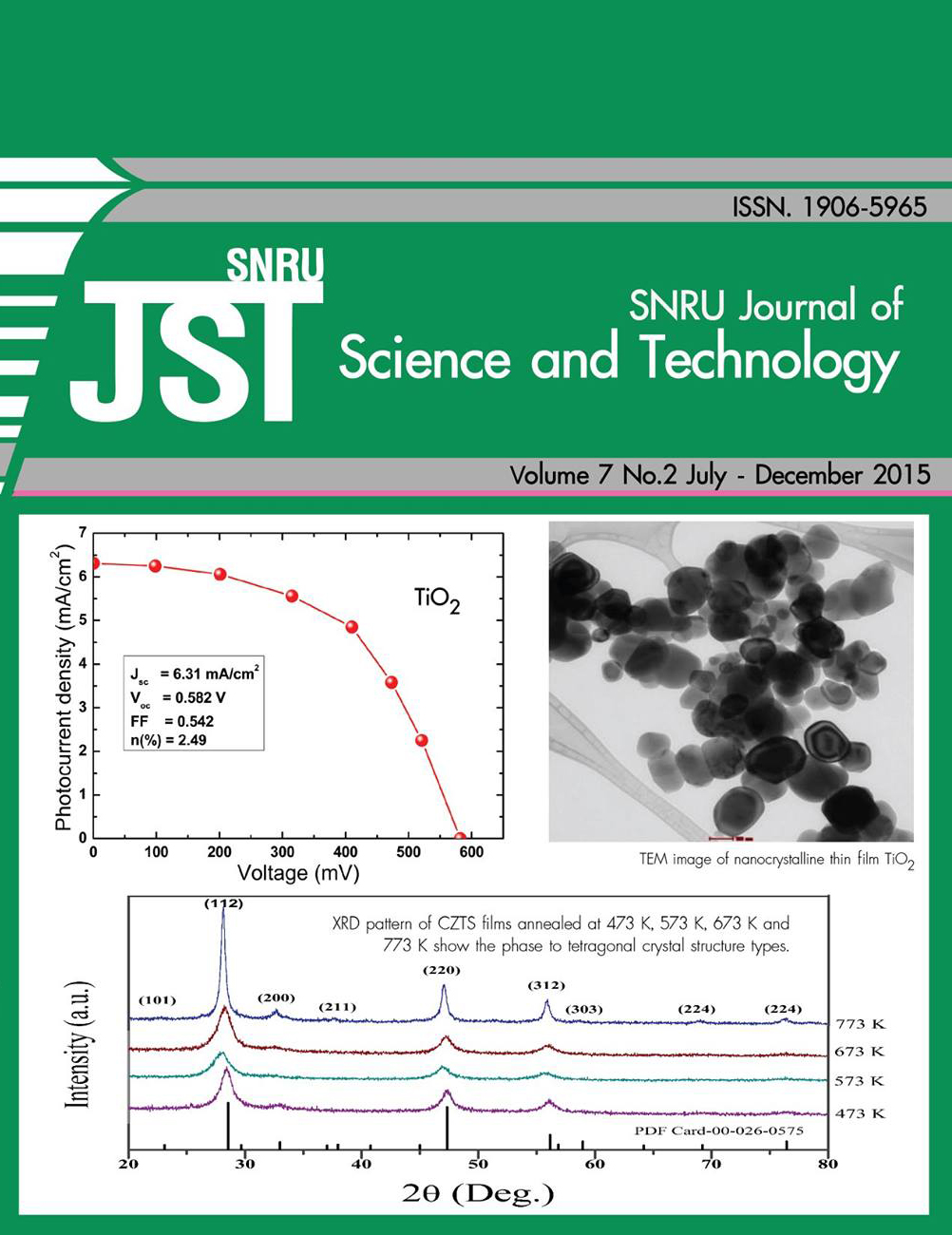การพัฒนารูปแบบการจัดการเรียนรู้โครงงานวิทยาศาสตร์ตามแนวคอนสตรัคชั่นนิซึม สำหรับนักเรียนชั้นประถมศึกษาปีที่ 6 The development of instructional model of science project based learning on constructionism theory for prathom suksa VI students
Keywords:
พัฒนารูปแบบ, การจัดการเรียนรู้โครงงานวิทยาศาสตร์, แนวคิดคอนสตรัคชั่นนิซึมAbstract
การวิจัยครั้งนี้เป็นการวิจัยและพัฒนามีวัตถุประสงค์เพื่อ 1) ศึกษาสภาพปัจจุบันและปัญหาในการจัดการเรียนรู้โครงงานวิทยาศาสตร์ 2) สร้างและประเมินรูปแบบการจัดการเรียนรู้โครงงานวิทยาศาสตร์ตามแนวคอนสตรัคชั่นนิซึม และ3) ศึกษาผลการนำรูปแบบการจัดการเรียนรู้โครงงานวิทยาศาสตร์ตามแนวคอนสตรัคชั่นนิซึมไปใช้ ผลการวิจัยพบว่า 1 สภาพปัจจุบันและปัญหาในการจัดการเรียนรู้โครงงานวิทยาศาสตร์ประกอบด้วย ครูมีพฤติกรรมการสอนและนักเรียนมีพฤติกรรมการเรียนรู้โครงงานวิทยาศาสตร์อยู่ในระดับน้อย 2 รูปแบบการสอนที่สร้างขึ้นประกอบด้วย 4 องค์ประกอบคือ1) หลักการ 2) วัตถุประสงค์ 3) การจัดการเรียนรู้และ4) การวัดและประเมินผล มีประสิทธิภาพ 94.44/89.94 สูงกว่าเกณฑ์มาตรฐาน 80/80 และนักเรียนกลุ่มตัวอย่างมีผลสัมฤทธิ์ทางการเรียนหลังเรียนสูงกว่าก่อนเรียนอย่างมีนัยสำคัญทางสถิติที่ระดับ.01 3 ศึกษาผลการนำรูปแบบการสอนไปใช้พบว่า 3.1 นักเรียนกลุ่มทดลองมีผลสัมฤทธิ์ทางการเรียนหลังเรียนสูงกว่ากลุ่มควบคุมอย่างมีนัยสำคัญทางสถิติที่ระดับ .01 3.2 นักเรียนกลุ่มทดลองมีความสามารถในการแก้ปัญหาผ่านเกณฑ์การประเมินโดยเฉลี่ยอยู่ในระดับมาก 3.3 คุณภาพชิ้นงานโครงงานวิทยาศาสตร์ของนักเรียนกลุ่มทดลองผ่านเกณฑ์การประเมินโดยเฉลี่ยอยู่ในระดับมาก 3.4 นักเรียนกลุ่มทดลองมีความพึงพอใจต่อรูปแบบการจัดการเรียนรู้โครงงานวิทยาศาสตร์ตามแนวคอนสตรัคชั่นนิซึม ผ่านเกณฑ์การประเมินโดยเฉลี่ยอยู่ในระดับมากที่สุด
This research and development aimed to 1) study current conditions and problems in instruction of the science project learning, 2) construct and evaluate the instructional model of science project-based on constructionism theory, and 3) study results of an imprementation the developed instructional model. The research findings were as follows: 1. The current conditions of the instruction of the science project revealed that the teacher’s teaching and the student’s learning behaviors were at a low level. 2. For the construction of the model of science project-based instruction, it yielded 4 components, that is, 1) Principles, 2) Objectives, 3) Learning Management, and 4) Measurement and Evaluation. In terms of model evaluation, it was found that the constructed model gained the efficiency value of 94.44/89.40 which exceeded the set criterion of 80/80. The learning achievement of the students in experimental group after using the constructed model was found to be higher than before using the model at the statistical significance at the .01 level 3. The evaluation of the model implementation revealed the following. 3.1 The learning achievement of the students in the experimental group after using the constructed model was found to be higher than that of the control group at the .01level of significance. 3.2 The problem-solving ability of the students in the experimental group was found to be at a high level. 3.3 The product of the students in the experimental group was found to be at a high level. 3.4 The satisfaction of the constructed model of the students in the experimental group was found to be at the highest level.









